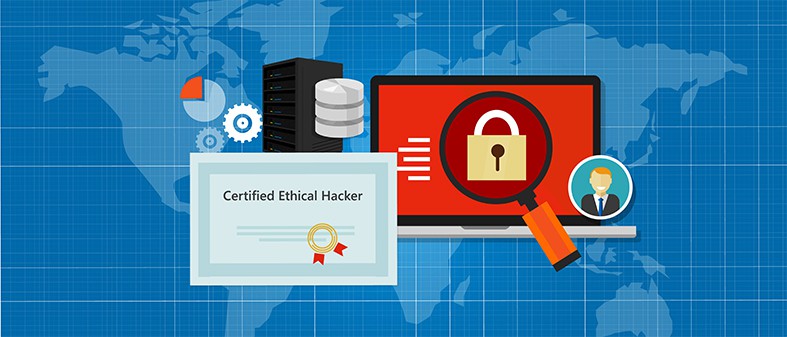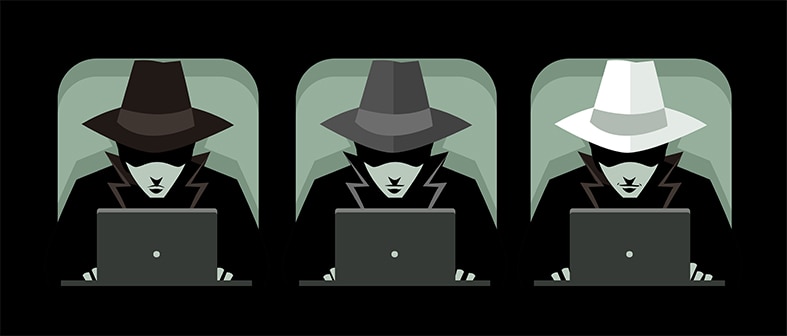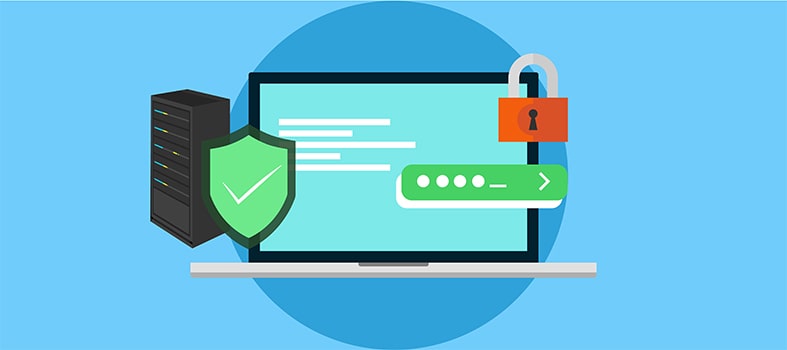What is the first thing that comes to mind when you hear someone say “I am a hacker”?
With no doubt, everybody will raise their eyebrows and wonder why someone who is involved in malicious things would announce it to the public. Why? Because, nowadays hacking is associated with malicious activities such as compromising computers, smartphones or the whole network either by inserting malware, viruses, keyloggers or through other common hacking techniques.
However, there are two types of hacking. The common one which a lot of people are aware of is unethical hacking. This type of hacking is fueled by financial gain, stealing information (digital, corporate and political espionage) or just for the fun of a challenge. The other type of hacking is called ethical hacking and this is the focus of this article.

Table of Contents
What is Ethical Hacking?
Ethical hacking also known as (white hat hacking) is an authorized practice of gaining access to computer systems, applications or a company’s infrastructure for the purpose of finding out threats, breaches or holes in the systems which unethical hackers may use to compromise the systems that can cause data or financial loss or other damages that can deface the organization.In ethical hacking, the hacker uses the same tools or techniques such as phishing, cryptography, enumeration, brute force, social engineering, and session hijacking that an unethical hacker would use in breaching an organization’s systems to test the network’s security. The goal is to identify the area of strengths and weaknesses in the security systems and to address any other issue found before a cyber attacker can take advantage of it.

Though ethical hacking is a practice that has been popular for a long time, it was John Patrick, IBM Vice president who gave it a name in 1995. Before then, hacking was popular among engineering students. They used the term to refer to ways by which they optimize systems and make it run more efficiently.
However, in the 1980’s when personal computers became more common, these computers were used in storing confidential information. This sparked the interest of these hackers and they started using their hacking skills to gain unauthorized access to this information, they sell them and then make profits from doing so. This is to say that ethical hacking started before unethical hacking. Interesting right?
Who Are Ethical Hackers?
Ethical hackers are cybersecurity specialists with in-depth knowledge of computer systems, security and networks and who have been trained to identify potential threats in the systems that can be used by malicious hackers to steal information or data or at worse, bring the entire system down.
Ethical hackers are also known as white hats while unethical hackers are known as black hats. White hats break into an organization’s system with the full permission of the organization -in fact, they are hired by the organization itself- and the motive is to improve the system by finding potential threats and vulnerabilities that malicious attackers can use to gain entry into the system.

Black hats however, is an unauthorized access into the system. These attackers carry out malicious acts solely for personal gains such as asking for ransom after stealing information or selling the stolen data for money. Black hats are illegal and punishable under the law while white hats are legal.
What Do Ethical Hackers Test?
Since the major role of ethical hackers is to help organizations protect their systems by fishing out vulnerabilities that can lead to breaches and cause damage to the systems. They test the security systems of organizations and to do this effectively, they do the following;
- Discover the operating system and network weaknesses in an organization’s technology infrastructure.
- Review the security systems the organization already has in place.
- Carry out penetration tests on the system to check how easy it is to launch a cyber attack on the system.
- Report the vulnerabilities found on the system during penetration testing to the organization.
- Ensure that these vulnerabilities are kept only between them and the organization.
- Delete all traces of the hack in order to keep malicious hackers from compromising the organization’s system through the loopholes.
- Find out and implement the best security measures to mitigate the weaknesses and flaws found.
- Carry out more penetration testing to find out if the implemented security features worked.
- Explore better options for security measures that are not effective.
- Ethical hackers also test how vulnerable the employees in the organization are and how likely they are to fall for phishing emails, then train them to be cyber aware.
Why Are Ethical Hackers Needed?
There are many benefits of hiring ethical hackers but the major advantage is in their capabilities to find vulnerabilities in an organization’s systems, inform the owners and improve it so that malicious hackers do not gain access to it.
Unethical hackers pose a serious threat to corporate networks, they combine various types of attack to gain access to networks hence it is important to have ethical hackers who are cyber security experts who understand how unethical hackers operate to find out threats in the networks, improve the network and defend it against attackers.

This is the best way for organizations to protect their systems from malicious attackers. Isn’t it smarter to fix a problem before it occurs than to deal with a security breach and its consequences?
Note:
Ethical hackers also help organizations see how well they can respond to a real hack by simulating a real-world attack. Also, taking security measures like ethical hacking is a good way for organizations to protect their reputation and build trust among their customers and investors- as they will be sure that their data is safe.How Do Ethical Hackers Hack?
Ethical hackers must have a deep understanding of the best hacking languages to make their work easier. This is why learning how to analyze and make modifications to code is very important. Also, White hats (ethical hackers) use a variety of techniques to test and secure systems. Some of these techniques include:
- Phishing: An ethical hacker may use phishing techniques to simulate a real-world attack and test the effectiveness of an organization’s security awareness training and technical controls. This involves sending an email or creating a fake website that appears to be from a trusted source, with the goal of tricking employees into revealing sensitive information such as login credentials. The information gathered is then used to improve the organization’s overall security posture.
- Enumeration: Enumeration is a process used by ethical hackers to gather information about a target system or network. This can include gathering information about system names, user accounts, and network resources, which can be used to identify potential security vulnerabilities. By conducting enumeration, ethical hackers can better understand a target system and its defenses, allowing them to simulate a real-world attack and test the system’s security.
- Social engineering: Ethical hackers may use social engineering techniques to manipulate individuals into revealing sensitive information, such as passwords or financial information. This can involve tricking individuals into clicking on a malicious link, posing as a trustworthy individual, or manipulating them into providing sensitive information over the phone. The goal of social engineering in ethical hacking is to test the effectiveness of an organization’s security awareness training and identify areas for improvement.
- Footprinting: Footprinting is a reconnaissance technique used by ethical hackers to gather information about a target system or network. This can include gathering publicly available information such as the target’s IP address range, domain name system (DNS) information, and network architecture. By conducting footprinting, ethical hackers can better understand a target system and its defenses, allowing them to simulate a real-world attack and test the system’s security.
- SQL injection: SQL injection is a technique used by ethical hackers to test the security of a web application by injecting malicious SQL code into an input field. The goal is to determine if the application is vulnerable to SQL injection attacks, which can result in sensitive data being compromised. Ethical hackers use this technique to identify and remediate vulnerabilities in the application, improving its overall security posture.
- Sniffing: Sniffing is a technique used by ethical hackers to monitor network traffic for sensitive information, such as passwords and confidential data. This is accomplished by intercepting and analyzing packets of data as they are transmitted over a network. Ethical hackers use sniffing to test the security of a network, identify potential vulnerabilities, and improve the overall security posture of the system.
- Cryptography: Cryptography is a technique used by ethical hackers to secure sensitive information, such as passwords and confidential data. This can involve using encryption algorithms to scramble data in transit or at rest, making it unreadable to unauthorized individuals. Ethical hackers use cryptography to test the strength of an organization’s encryption methods and identify areas for improvement, helping to ensure the security and privacy of sensitive information.
- Session hijacking: Session hijacking is a technique used by ethical hackers to take over an active user session by intercepting and using session tokens. This can involve stealing a user’s session cookie, or using tools to manipulate network traffic and inject malicious data into an active session. Ethical hackers use session hijacking to test the security of a system and identify potential vulnerabilities, helping to improve the overall security posture of the system.

What Skills Does an Ethical Hacker Need?
Since ethical hacking is aimed at finding vulnerabilities that can be compromised by malicious hackers in a network by breaking into the system like an unethical hacker would, ethical hackers need to have an in-depth knowledge of all networks, codes and security measures before they can do their job effectively.
Therefore, white hats need the following skills to carry out ethical hacking.
- Programming languages; JavaScript, Ruby, PHP, C Programming, Bash, Python, SQL, Perl.
- Database Skills
- Scripting knowledge
- Wireless technologies
- Cryptography
- Networking skills
- Social engineering skills
- Web applications
- Understanding of different operating systems such as Apple iOS, Linux Operating system, Microsoft Windows, Android OS, Apple macOS etc.
- Ability to use different white hacking tools such as Network mapper, Intruder, Metasploit, Maltego, Wireshark, burp suite, superscan, Nessus, Ghost touch, etc.

What are the Different Types of Hackers?
There are many types of hackers but the three common types are white hat hackers, black hat hackers and gray hat hackers. The three major types of hackers as well as the not so common types will be briefly discussed below.
White hat hackers
White hat hackers are ethical hackers and they are cybersecurity professionals who are often hired by organizations to use their technical expertise to help them improve or protect their systems. They use all the tools or techniques that malicious hackers would use in hacking systems-the main thing that differentiates them from malicious hackers is that their actions are considered legal since the owners are aware of their activities.
Black Hat hackers
Black hat hackers like white hat hackers are also computer experts but the main difference between them is that their actions are illegal because they break into an organization’s system, without the knowledge of the owners, look for vulnerabilities and then exploit these vulnerabilities for their personal gain (usually financial). They carry out their attacks using several methods including spreading malware or viruses, sending phishing emails to employees or to high profile targets(whaling), using brute force attacks, distributed denial of service (DDOS) etc.
Gray hat hackers
This type of hacker can be referred to as “lukewarm” hackers and this is because they are not totally white hats and they are not bad enough to be called black hats either. Their intention is not bad because when they break into an organization’s system, they do so without the knowledge of the organization but they don’t exploit the vulnerabilities found, instead, they report it to them and offer to fix the loopholes for a fee.
Script kiddies
These are amateur or young hackers who lack in-depth knowledge of hacking itself. They only look for scripts, malware or tools made by other hackers to hack into the system. This type of hacking is also considered illegal.

Green hat hackers
Like script kiddies, they are also young hackers who are eager to learn from the white hat hackers. Since they have limited knowledge, they may carry out illegal actions in the process of learning hence their actions can be legal or illegal.
Blue hat hackers
Blue hat hackers can be defined in to different ways; the first category are hackers who gain access to systems to get revenge. Since this can cause irreparable damage to the target, it is considered illegal.
The second category are the ones who are employed by the organization to help improve their security system like white hat hackers.
Red hat hackers
This type of hacker is like white hat hackers in that they also have good intentions but they are still different because unlike white hat hackers, they do not follow the rules and regulations and use illegal techniques to achieve their goals. Though their aim is to attack black hat hackers, they are also illegal.
State/Nation sponsored hackers
These hackers are sponsored by the government to spy on other countries. The aim is usually for political reasons. These people only report their findings to the government that sent them. Their actions are considered illegal in the target country.
Hacktivist
These hackers are also considered illegal because their actions are unethical. They often hack government systems to gain for political or social reasons.
Malicious insider
This type of hackers are also known as whistleblowers because they work within an organization but their intention is to exploit the vulnerabilities within the organization for their own personal gain -usually monetary.
Cryptojackers
These are hackers whose focus are mainly on people who are into cryptocurrency. They distribute malware in their devices and steal money from the users.

Bank robber hackers
As the name suggests, these hackers exploit banks’ systems with the aim of stealing money. They can go as far as preparing fake receipts and invoices or use DDos to carry out their malicious aim.
Who Typically Uses Ethical Hackers?
Every organization concerned about the security of its networks needs to protect it. Ethical hackers will help them identify and address any threats found in their networks before malicious hackers get the chance to exploit these vulnerabilities. Financial institutions, government agencies, law enforcement agencies and individual companies alike all need ethical hackers to help improve their networks.
Is Ethical Hacking Legal?
Yes. Ethical hacking is legal. Since it is done by white hat hackers with the permission of the owner to find loopholes and strengthen it.
How to Become an Ethical Hacker?
Generally, to become an ethical hacker, one needs to have a deep understanding of all the systems, programming languages, security measures and codes to get the job done correctly. Though some of these skills can be learned through study and practice. It is better to enroll for courses that teach the nitty gritty and where one can have the chance to gain practical experience.
To get started, these are some of the best ethical hacking courses one can find online;
- INE Ethical Hacking (Denial of Service)
- Hacking And Patching Certification By University Of Colorado (Coursera)
- Penetration Testing And Ethical Hacking (Cybrary)
- Certified Ethical Hacker (CEH) Certification
- Ethical Hacking Course for Beginners and Experts (Pluralsight)
- Certified Security Testing Associate (CSTA)
- The Complete Ethical Hacking Course: Beginner To Advanced (Udemy)
- Learn Ethical Hacking from Scratch (Udemy)
- Become An Ethical Hacker–(LinkedIn Learning)

Is Ethical Hacking a Good Career?
Yes. Ethical hacking is a great career choice. Though ethical hacking is a challenging field, with dedication and consistency, anyone who is passionate about cybersecurity can make a career in it.
What is an Ethical Hackers Salary?
The average salary of an ethical hacker in the US ranges between $95,000 to 121,000. Salary varies depending on level of experience, education, company, certifications and additional skills. Overall, ethical hackers are in high demand across the globe as organizations would do everything possible to protect their networks.

